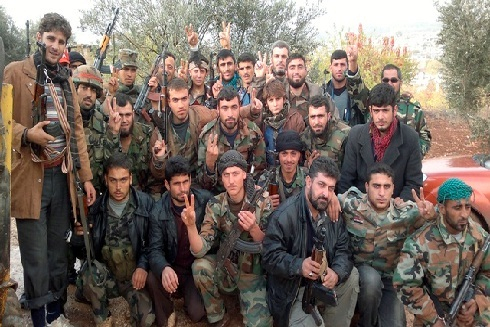
Doha: At a desert base, Gulf state Qatar is covertly training moderate Syrian rebels with US help to fight both President Bashar Al Assad and Daesh and may include more overtly Islamist insurgent groups, sources close to the matter say.
The camp, south of the capital between Saudi Arabia’s border and Al Udeid, the largest US air base in the Middle East, is being used to train the Free Syrian Army (FSA) and other moderate rebels, the sources said.
Reuters could not independently identify the participants in the programme or witness activity inside the base, which lies in a military zone guarded by Qatari special forces and marked on signposts as a restricted area.
But Syrian rebel sources said training in Qatar has included rebels affiliated to the “Free Syrian Army” from northern Syria.
The sources said the effort had been running for nearly a year, although it was too small to have a significant impact on the battlefield, and some rebels complained of not being taught advanced techniques.
Small groups of 12 to 20 fighters are identified in Syria and screened by the Central Intelligence Agency, the sources said.
Once cleared of links with “terrorist” factions, they travel to Turkey and are then flown to Doha and driven to the base.
“The US wanted to help the rebels oust Al Assad but didn’t want to be open about their support, so to have rebels trained in Qatar is a good idea, the problem is the scale is too small,” said a Western source in Doha.
The CIA declined to comment, as did Qatar’s foreign ministry and an FSA spokesman in Turkey.
It is not clear whether the Qatari programme is coordinated with a strategy of Western and Gulf countries to turn disparate non-Islamist rebel groups into a force to combat the militants.
Such efforts have been hampered by Western hesitancy about providing significant military aid, because it could end up with extremists. Gulf states are fighting against Daesh but also say Al Assad is the bigger problem.
“Moderate rebels from the FSA and other groups have been flown in to get trained in things like ambush techniques,” said a source close to the Qatari government who asked not to be named due to the sensitivity of the topic.
“The training would last a few months, maybe two or three, and then a new group would be flown in, but no lethal weapons were supplied to them,” one of the sources said.
As the war against Al Assad has dragged on, frustrated rebels asked their trainers for more advanced techniques, such as building improvised explosive devices (IEDs), requests which were always denied.
“They complain a lot and say that going back they need more weapons or more training in IEDs but that’s not something that’s given to them,” said a Qatar-based defence source.
The Qatar project was conceived before the declaration of the hardline Daesh, when militants belonging to its predecessor organisation were not regarded as an international security threat.
The group’s rise in Syria and Iraq has hampered the rebellion: Moderate groups cannot fight Al Assad when the better-armed Daesh seeks their destruction as it strives to build its “caliphate”.
In recent weeks, the Qataris, disappointed by lack of progress in the fight against Al Assad, have started to consider training members of the Islamic Front, a coalition of Islamist rebels less militant than Daesh or the Al Qaida-linked Nusra Front, but stronger than the FSA.
None have been trained as yet, but Qatar has sought to identify candidates, the sources say.
A source who works with rebel groups said Qatar had delivered weapons, mostly mortar bombs, to the Islamic Front and some FSA brigades about two months ago and had paid some salaries for Islamic Front groups.











